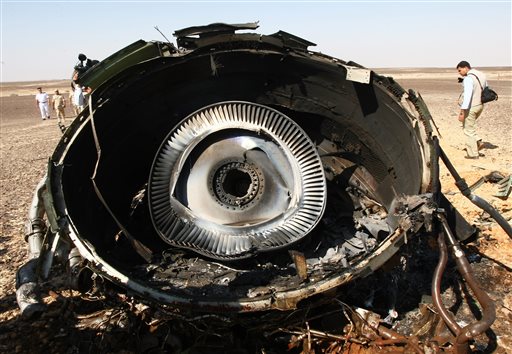
Egypt’s civil aviation ministry said on Tuesday there were no facts to substantiate assertions by Russian officials that the Russian airliner that crashed in Egypt’s Sinai Peninsula on Saturday broke up in mid-air.
But spokesman Mohamed Rahmi confirmed that no distress call had been received before the crash, which left wreckage from the Metrojet Airbus 321, carrying Russian holidaymakers back to St Petersburg from the Red Sea resort of Sharm el-Sheikh, strewn over more than 3 km (2 miles) of desert.
“No communication from the pilot was recorded at the navigation centers requesting anything,” he told Reuters.
Rahmi said the investigating team, led by Egypt and aided by experts from Russia, Airbus and Ireland, where the plane is registered, had returned to the crash site on Tuesday.
Once investigations at the site were completed, they would focus on analyzing the contents of the black box flight recorders, Rahmi said.
Sources on the investigation committee have said the recorders are in good condition and should yield clues.
Rahmi said there was no proof yet that the plane had broken up in flight. “This could be a long process and we can’t talk about the results as we go along,” he said.
However, the fact that no distress call was received and the wreckage was scattered widely has suggested a sudden breakup to many experts. Theories floated so far range from a missile attack, or a bomb on board, to a structural failure.
A Sinai-based Egyptian militant group allied to Islamic State claimed on Saturday to have shot down the plane in response to Russia’s military intervention in Syria in support of President Bashar al-Assad against rebels including Islamic State.
However, the militants are not believed to have missiles capable of hitting a plane at 30,000 feet. A source in the committee analyzing the flight recorders told Reuters on Monday that the plane had not been struck from the outside. Kremlin spokesman Dmitry Peskov said on Tuesday it was inappropriate to link the crash to Russia’s military strategy in Syria.
HOLIDAY CANCELLATIONS
Some have also pointed to a 2001 incident, when the Airbus 321’s tail section struck the tarmac on landing, as a possible cause of structural weakness.
Faulty “tail-strike” repairs have caused at least two catastrophic crashes in the past. However, the plane had passed safety checks and its operator, Kogalymavia, owner of the Metrojet brand, has said damage from the 2001 mishap was fully repaired and could not have been a factor in the Sinai crash.
Egyptian Tourism Minister Hisham Zaazou said he had heard from tour operators that the crash was affecting bookings by Russian tourists to Egypt, but he voiced confidence that the industry could recover quickly.
“There were some cancellations from the Russian market. Future bookings are slowing down from Russia,” he told Reuters in London.
Tourism is a major source of hard currency in Egypt and is vital to secure its economic recovery. About a third of the 10 million or so tourists who visit each year are from Russia, Zaazou said.
The head of the health unit at Sharm el-Sheikh airport, Medhat Qandil, said the remains of the last 28 people killed in the crash had been sent to Moscow on Tuesday aboard a military jet, along with luggage from the doomed plane and personal belongings found at the crash site.
The bodies of all the other 196 dead passengers and crew had already arrived in Russia, but the final 28 were delayed as the corpses were not intact and required search teams to gather up body parts and conduct DNA tests, Qandil said.
REUTERS

Leave a Reply
You must be logged in to post a comment.